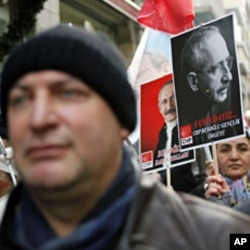The criticism comes as two of the main opposition parties claim the government is using the judiciary to silence opposition in the country.
In a detailed report, the Council of Europe's commissioner on human rights, Thomas Hammerberg, has raised serious concerns that Turkey's judiciary is threatening fundamental human rights.
"There are real problems in the way the system of justice function, including the judicial system, and that has an impact on human rights," said Hammerberg. "[That's] obvious, you don't have justice in all cases being brought into the system."
One of the main concerns raised in the report is the growing number of arrests of political party members. The ongoing investigation into the Kurdistan Communities Union (KCK) is cited as a particular concern. Turkish authorities believe the KCK is the political wing of the Kurdish rebel group, the Kurdistan Workers' Party, or PKK.
According to local human-rights groups, more than 4,000 people have been detained since 2009, most of them members of the country's pro-Kurdish Peace and Democracy Party (BDP). BDP parliament member Ertugral Kurkcu says the detentions have little to do with fighting terrorism and more to do with undermining the political party.
"These people are kidnapped. They have no guilt. Many of them elected people," said Kurkcu. "Many of them trade union leaders. All influential politicians, middle men in Kurdish politics. They have no relation with violence. They have not even been accused of being affiliated with any kind of violent action."
Hammerberg echoed such concerns, saying he believes in many cases there appeared to be little evidence to justify the detentions. Many of those detained in the probe have been held for years without trial. The Council of Europe report also raised pretrial detention as an area of serious concern.
Hammerberg claims his interviews with members of the judiciary suggest pretrial detention is being used as a punishment.
"I was discussing with a prosecutor in Diyarbakir and spelling out there should be reasons to detain someone before the final trial, and he said at least they will learn a lesson. But why does the penitentiary system take on, teach lessons to people who perhaps may be innocent?" Asked Hammerberg. "There have been cases up to 10 years. That [is] absolutely outrageous. No one should be held before [being] proven guilty for such long periods."
The leader of the main opposition People's Republican Party, or CHP, Kemal Kilicdaroglu, strongly attacked pretrial detention earlier this month, and claimed that Turkey is becoming "an open prison." Two of his parliamentary deputies have been held in jail for more than three years, as part an investigation into an alleged plot to overthrow the government.
The European Court of Human Rights has repeatedly ruled against Turkey on the issue of pretrial detention. Facing mounting criticism, Justice Minister Sadullah Ergin announced a package of reforms that include addressing pre-trial detention.
He said decisions pertaining to arrest, or the refusal of a request for release on bail, will now have to be clearly written out. He said the courts will have to justify with concrete facts any strong suspicion that a defendant will commit a crime. He said they will have to make clear the purpose behind a detention and ensure that it is reasonable.
Riza Turmen, a deputy for the main opposition and a former judge for the European Court of Human Rights, says the reforms are cosmetic, and that the reform does not apply to anyone held in connection with anti-terror laws. He adds that controversial portions of those laws have resulted in the detention of nearly 100 journalists - another area of concern raised by the Council of Europe report.
But Turmen argues a more fundamental threat is facing Turkey. "The problem today in Turkey [is], there is enormous concentration of power in the hands of one party," he said. "The government controls the judiciary. The government controls all the independent institutions. Turkey has never seen such a big concentration of power, and such a concentration of power is detrimental to any democracy."
In his report, Hammerberg expresses concern about the government's influence on Turkey's judiciary. He acknowledges that Turkey faces a serious problem of terrorism and says the government's commitment to reform appears to be genuine, but now is the time for action.
"We are still waiting for implementation of signals we have received from the government," said Hammerberg. "It's a question of real implementation, not only talks and statements, when it comes to reforms and genuine changes."
In the early years of its decade-long rule, the AK Party won praise in combating torture and ending extra-judicial killings. But observers warn that good will is fast running out with the main opposition parties, along with a growing body of evidence - of which the Council of Europe report is the latest - that raises concerns about increasing authoritarian tendencies.





